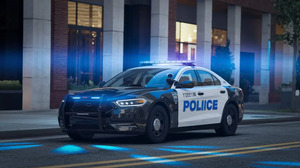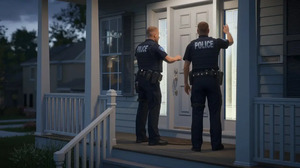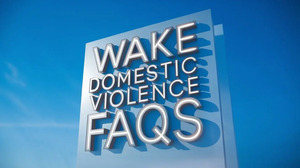FAQs About Restraining Orders in Wake County, North Carolina

If you’ve been accused of domestic violence in Wake County, North Carolina, it’s normal to have questions about domestic violence protective orders, your rights, and the potential consequences you face. This guide provides an overview of key information related to DV accusations and Chapter 50B protection orders in Wake County.
It's important to note that being accused of domestic violence does not mean you’re guilty. Understanding the legal process is an important first step in navigating this challenging situation. If you need legal help, call John Fanney now at 919-617-7009.
In North Carolina, domestic violence is defined as specific acts committed against someone you have or had a close personal relationship with. This includes actions like trying to hurt them physically, making them fear immediate serious harm, or serious harassment causing substantial emotional distress. It also includes acts defined in other statutes like stalking, assault on a female, or sexual assault. It's important to remember that acts of self-defense are not considered domestic violence.
In North Carolina, a "personal relationship" for a domestic violence protective order usually means:
- You are currently married or were previously married.
- You are or were in a romantic relationship with someone. This doesn't mean just casual dating or knowing them from work or social events. To be considered a personal relationship for a DVPO, the relationship must have been romantic and continuous over time.
- You are related in certain ways, such as parents and children, grandparents and grandchildren, or someone acting as a parent to a child.
- You have a child together.
- You currently live together or lived together in the past.
You can file for a domestic violence protective order in Wake County by starting a civil action or by filing a motion within an existing family law case under N.C.G.S. Chapter 50, the North Carolina Divorce, Child Support and Custody law. The District Court in Wake County handles domestic violence protective orders. To get a DVPO, you must claim that domestic violence occurred against you or a minor child who lives with you. You can file for a DVPO yourself, or you can hire an attorney to help you.
Law enforcement agencies in North Carolina are required to enforce valid protective orders issued in the state, even without a separate court order. This includes emergency orders and orders issued in other states or by tribal courts. Importantly, a valid protective order includes emergency or temporary orders (ex parte orders). If you have a protective order from another state or an Indian tribe, it is generally enforceable in North Carolina as if it were issued by a North Carolina court. If the police want to talk to you about the allegations, it is generally a good idea to request to speak with a lawyer and exercise your right to remain silent.

If a judge in Wake County finds that domestic violence occurred, North Carolina law requires the Court (the Judge) to issue a protective order to prevent further domestic violence. The protective order can include things like:
- Ordering the alleged abuser not to commit any further acts of domestic violence.
- Giving the victim possession of the home and ordering the defendant to leave.
- Requiring the alleged abuser to pay child support or spousal support.
- Awarding temporary custody of children and setting up visitation.
- Ordering the defendant to attend a treatment program for domestic violence.
- Ordering the defendant not to contact the complainant at home, work, or anywhere else.
Violating a domestic violence protective order in North Carolina can lead to both civil and criminal consequences. Violating a DVPO is also a separate criminal offense in North Carolina. Someone who knowingly violates a valid protective order in North Carolina can be charged with a Class A1 misdemeanor, which can carry a sentence of active jail time. Importantly, the law in North Carolina says that law enforcement must arrest and take someone into custody if they have probable cause to believe the person knowingly violated a protective order by being somewhere they were ordered not to be, or by contacting or trying to contact someone they were ordered not to. North Carolina law enforcement are required to enforce protective orders issued in the state. North Carolina law enforcement also must enforce valid protective orders issued in other states or by tribal courts.
If a judge issues an ex parte order or a domestic violence protective order in Wake County, the judge can Order the defendant to turn over any guns, ammunition, and gun permits to the Sheriff if the Court finds certain factors:
- The defendant used a deadly weapon or threatened to, or has a history of violence with guns.
- The alleged abuser threatened to seriously hurt or kill the victim or their child.
- The defendant threatened to kill themself.
- The abuser seriously injured the victim or their child.
In North Carolina, a domestic violence protective order can last up to one year. The alleged victim can ask the Court to renew the Domestic Violence Protective Order for additional time, even if there have not been additional “acts of domestic violence” during the pendency of the existing 50B Order.
Yes. You do not have to be married to someone to get a domestic violence protective order in North Carolina. Remember, the Court will consider whether a "personal relationship" exists, as defined by North Carolina law, which can include dating relationships.
John Fanney - Wake County Domestic Violence Lawyer

If you’re facing domestic violence accusations in Wake County, you should be aware of several key points as you navigate the legal process. First and foremost, it's important to comply with any existing protective orders, even if you disagree with the accusations. Violating an order can lead to serious legal consequences, regardless of the circumstances surrounding the original complaint. Be aware of your rights, including the right to remain silent and the right to legal representation.
Understanding the nuances of domestic violence laws in North Carolina, including what constitutes a "personal relationship" and the potential relief a judge can order, is helpful in making informed decisions about your case. Protective orders and criminal charges involving DV, can affect various aspects of your life, including housing, child custody, and firearm possession.
The Fanney Law Firm in Wake County has experience handling domestic violence cases and provides guidance tailored to individual situations. Call John Fanney now at 919-617-7009
 Fanney Law Office, PLLC Home
Fanney Law Office, PLLC Home










